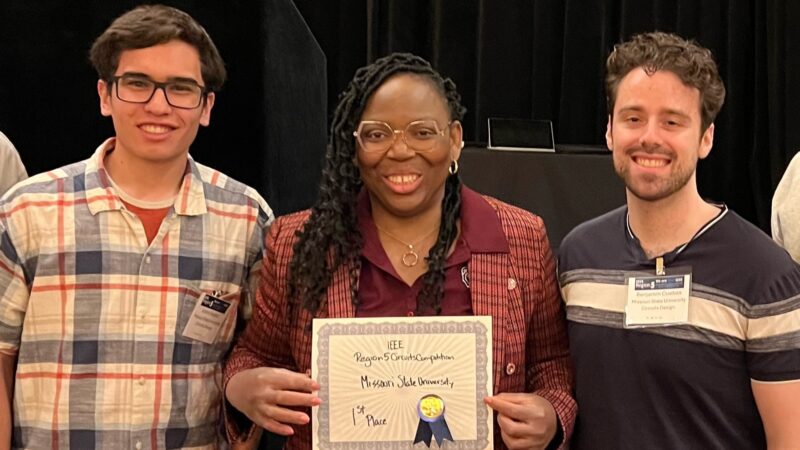The duo of Justin Fausto and Ben Cuebas from Missouri State University not only attended the recent IEEE (Institute of Electrical and Electronics Engineers) 2024 Region 5 Annual Meeting and Student Competitions. They also won first place in the circuit design competition, taking home $500.
The event took place in Springdale, Arkansas, from April 5-7. MSU students also participated in the robotics and ethics competitions.
Besides Missouri, region 5 includes the states of Arkansas, Colorado, Kansas, Louisiana, Oklahoma and Texas. The region comprises 31 sections and over 90 student branches.
Dr. Theresa Odun-Ayo, director of the cooperative engineering program in MSU’s College of Natural and Applied Sciences, accompanied the students at the conference. She also serves as faculty advisor for the IEEE student chapter at MSU.
“Competitions like IEEE offer students invaluable opportunities to build confidence, network with industry professionals, and gain recognition for their academic achievements,” Odun-Ayo said.
The winning duo
Fausto is a senior in the engineering program. Originally from the Springfield area, he transferred to MSU in fall 2022.
“As a child, I was always interested in taking things apart and learning how they worked,” Fausto said. “This interest throughout my life is what got me on the engineering track.”
Upon graduating, he plans to pursue a career in either hardware design or chip design.
A Springfield native, Cuebas is also a senior in the engineering program, with an emphasis in electrical engineering.
An IEEE member, he recruited Fausto to join the competition together as a team.
Cuebas would like to attend graduate school after graduation. He then plans to work in the electrical engineering field.
The circuit design challenge
Hosted by Keysight Technologies, 12 schools competed in this challenge. It presented participants with a challenging task: designing an AM radio receiver and an audio amplifier capable of playing through a speaker.
While the competition provided a general framework for the circuit’s design, it was up to the participants to navigate the intricacies of implementation.
“We realized early on the organizers had not thoroughly tested the parameters,” Cuebas said. “We couldn’t complete the circuit with what we were provided, but we could explain exactly why it won’t work.”
This problem was caused by the high–frequency nature of AM receivers. The tiny signal obtained from the AM antenna was not enough to activate the detector circuit. Additionally, the amplifiers supplied could not pass the required frequencies. As such, no teams could design a functional circuit.
Fausto and Cuebas credit their first-place win to their ability to explain why the circuit did not work, as well as present a completed audio amplifier.
“I’m incredibly proud of our students’ hard work and dedication,” Odun- Ayo said. “Their win not only reflects their talent, but also their determination to excel in their field.”
About IEEE
IEEE provides a platform for students to engage in competitions, attend events and network with professionals in their field, promoting both academic and professional development.

